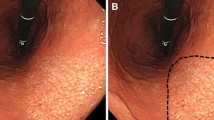Abstract
Background
Helicobacter pylori infection and hyperplastic polyp are known to have strong connections, but there are not enough randomized controlled trial data.
Aims
To evaluate the effect of H. pylori eradication on gastric hyperplastic polyp.
Method
This is an open-labeled, single-center, randomized controlled trial. Patients with hyperplastic polyp and current infection of H. pylori were randomly assigned to eradication or non-eradication groups. All participants underwent follow-up endoscopy to investigate the regression of gastric polyps. Gastric polyp regression was defined as the disappearance of polyps or a reduction of more than 50% in size.
Results
Thirty-two patients were randomized to eradication (n = 17) and non-eradication groups (n = 15). Final included patients were 14 in eradication group and 13 in non-eradication group. All patients showed polyp regression in eradication group, whereas no regression was observed in non-eradication group (P < 0.001). Disappearance of polyp (n = 7) and decrease in size (n = 7) were observed in eradication group. In non-eradication group, no change (n = 5), increase of size (n = 5), and increase of number (n = 3) were observed. Mean regression time was 6.8 months, and disappearance time was 9.8 months. In non-eradication group, hyperglycemia was noted in 50% of progression group but not noted in no change group (P = 0.057).
Conclusions
H. pylori eradication induced regression of hyperplastic polyp, and persistent H. pylori infection was related to progression of gastric polyp.
Clinical Trial Registration
ClinicalTrials.gov ID: NCT03065868



Similar content being viewed by others
References
Nam SY, Park BJ, Ryu KH, et al. Effect of Helicobacter pylori infection and its eradication on the fate of gastric polyps. Eur J Gastroenterol Hepatol. 2016;28:449–454.
Daibo M, Itabashi M, Hirota T. Malignant transformation of gastric hyperplastic polyps. Am J Gastroenterol. 1987;82:1016–1025.
Orlowska J, Pietrow D. Multifocal gastric carcinoma arising from hyperplastic and adenomatous polyps. Am J Gastroenterol. 1990;85:1629–1634.
Orlowska J, Jarosz D, Pachlewski J, et al. Malignant transformation of benign epithelial gastric polyps. Am J Gastroenterol. 1995;90:2152–2159.
Cristallini EG, Ascani S, Bolis GB. Association between histologic type of polyp and carcinoma in the stomach. Gastrointest Endosc. 1992;38:481–484.
Ginsberg GG, Al-Kawas FH, Fleischer DE, et al. Gastric polyps: relationship of size and histology to cancer risk. Am J Gastroenterol. 1996;91:714–717.
Suzuki S, Ohkusa T, Shimoi K, et al. Disappearance of multiple hyperplastic polyps after the eradication of Helicobacter pylori. Gastrointest Endosc. 1997;46:566–568.
Ohkusa T, Miwa H, Hojo M, et al. Endoscopic, histological and serologic findings of gastric hyperplastic polyps after eradication of Helicobacter pylori: comparison between responder and non-responder cases. Digestion. 2003;68:57–62.
Nam SY, Park BJ, Ryu KH, et al. Effect of helicobacter pylori eradication on the regression of gastric polyps in national cancer screening program. Korean J Intern Med. 2018;33:506–511.
Goddard AF, Badreldin R, Pritchard DM, et al. The management of gastric polyps. Gut. 2010;59:1270–1276.
Ji F, Wang ZW, Ning JW, et al. Effect of drug treatment on hyperplastic gastric polyps infected with Helicobacter pylori: a randomized, controlled trial. World J Gastroenterol. 2006;12:1770–1773.
Carmack SW, Genta RM, Schuler CM, et al. The current spectrum of gastric polyps: a 1-year national study of over 120,000 patients. Am J Gastroenterol. 2009;104:1524–1532.
Shaib YH, Rugge M, Graham DY, et al. Management of gastric polyps: an endoscopy-based approach. Clin Gastroenterol Hepatol. 2013;11:1374–1384.
Ohkusa T, Takashimizu I, Fujiki K, et al. Disappearance of hyperplastic polyps in the stomach after eradication of Helicobacter pylori. A randomized, clinical trial. Ann Intern Med. 1998;129:712–715.
Nam SY, Park BJ, Nam JH, et al. Association of current Helicobacter pylori infection and metabolic factors with gastric cancer in 35,519 subjects: a cross-sectional study. United Eur Gastroenterol J. 2019;7:287–296.
Crawley DJ, Holmberg L, Melvin JC, et al. Serum glucose and risk of cancer: a meta-analysis. BMC Cancer. 2014;14:985.
Yu F, Guo Y, Wang H, et al. Type 2 diabetes mellitus and risk of colorectal adenoma: a meta-analysis of observational studies. BMC Cancer. 2016;16:642.
Jung YS, Park CH, Park JH, et al. Efficacy of Helicobacter pylori eradication therapies in Korea: a systematic review and network meta-analysis. Helicobacter. 2017;22:e12389.
Choi KS, Jun JK, Suh M, et al. Effect of endoscopy screening on stage at gastric cancer diagnosis: results of the National Cancer Screening Programme in Korea. Br J Cancer. 2015;112:608–612.
Funding
This study was supported by a grand from Korean Colleague of Helicobacter and Upper Gastrointestinal Research (2015), Korea.
Author information
Authors and Affiliations
Contributions
SY Nam contributed to the study design. SY Nam, SY Lee, SW Jeon, YH Kwon, and HS Lee contributed to the acquisition of data, implementation and supervision of the study. SY Nam and SW Lee contributed to the assembly of data. SY Nam and SW Lee analyzed the data. SY Nam took the responsibility for the accuracy of the data analysis and had full access to the data in the study. All authors participated in the writing of the manuscript and approved the final version of the manuscript.
Corresponding author
Ethics declarations
Conflict of interest
All authors declare that they have no potential conflicts including financial interests, activities, relationships, and affiliations.
Additional information
Publisher's Note
Springer Nature remains neutral with regard to jurisdictional claims in published maps and institutional affiliations.
Electronic supplementary material
Below is the link to the electronic supplementary smaterial.
Rights and permissions
About this article
Cite this article
Nam, S.Y., Lee, S.W., Jeon, S.W. et al. Helicobacter pylori Eradication Regressed Gastric Hyperplastic Polyp: A Randomized Controlled Trial. Dig Dis Sci 65, 3652–3659 (2020). https://doi.org/10.1007/s10620-020-06065-0
Received:
Accepted:
Published:
Issue Date:
DOI: https://doi.org/10.1007/s10620-020-06065-0




